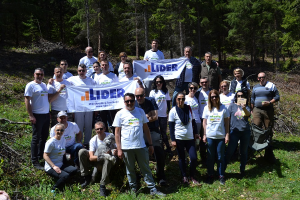SARAJEVO, May 24 (FENA) - At the conference on the importance of the care economy for gender equality, which was held today in Sarajevo, the results of the UN Women BiH research "Initial study on the nurture and care economy in BiH" were presented, in which an overview key characteristics of policies, program options, as well as the disproportionate responsibility for care and nursing that has been transferred to women, which is the source of gender inequality.
"I don't have time" is a sentence that is often used, and it reflects the lack of time, which is the situation in which women find themselves every day due to being overloaded with unpaid work of nurture and care.
Resident Coordinator of the United Nations in Bosnia and Herzegovina Ingrid MacDonald intensively deals with the issue of the economy of nurture and care, because it is globally one of the fastest growing sectors and the main driver of employment, mostly women, who often make up the majority of the workforce in that sector.
She stated that women in Bosnia and Herzegovina spend an average of six hours every day performing unpaid care work, while in EU countries it is 3.5 hours. On the other hand, men spend half as much time on these jobs.
"Women and men in Bosnia and Herzegovina need program solutions that will establish systems of support and care, which are based on respect for human rights, gender-responsive, inclusive towards people with disabilities, sensitive towards people of older age and which encourage social and economic progress," pointed out MacDonald.
A representative of UN Women in BiH, Jo-Anne Bishop, believes that, although work in the field of care promotes employment and economic development, it is still systematically underestimated. She supported this claim with the data that "if unpaid care were paid the minimum, these workers would contribute $11 billion a year to the world economy".
Therefore, UN Women in Bosnia and Herzegovina, with the support of Sweden and cooperation with the Economic Institute in Sarajevo, prepared a preliminary study on the economy of nurture and care in Bosnia and Herzegovina.
The study helps, as Bishop said, to see the uneven distribution of care and nursing responsibilities, which results in gender inequality both in households and in the labor market.
"We hope that the study will help to initiate changes in three areas: to recognize the economic and social value of care work, to reduce the informal provision of care and assistance, to redistribute roles and responsibilities between men and women, and for the unpaid work in care to be appropriately rewarded, and women who perform such work should be adequately represented in decision-making," she stated.
In this sense, the FBiH Minister for Labor and Social Policy Adnan Delić said that policy measures have already been initiated, and the presented study is an ideal opportunity for everyone to work together and cooperate on the implementation of the recommendations.
"At this moment, we need a social map, that is, registers in order to target measures and funds in the most adequate way. In the coming period, our focus is on creating a social map in the Federation of Bosnia and Herzegovina. The data should present a realistic overview of the social situation in the FBiH, and the best policies will be created," emphasized Minister Delić.
(FENA) S. R.









